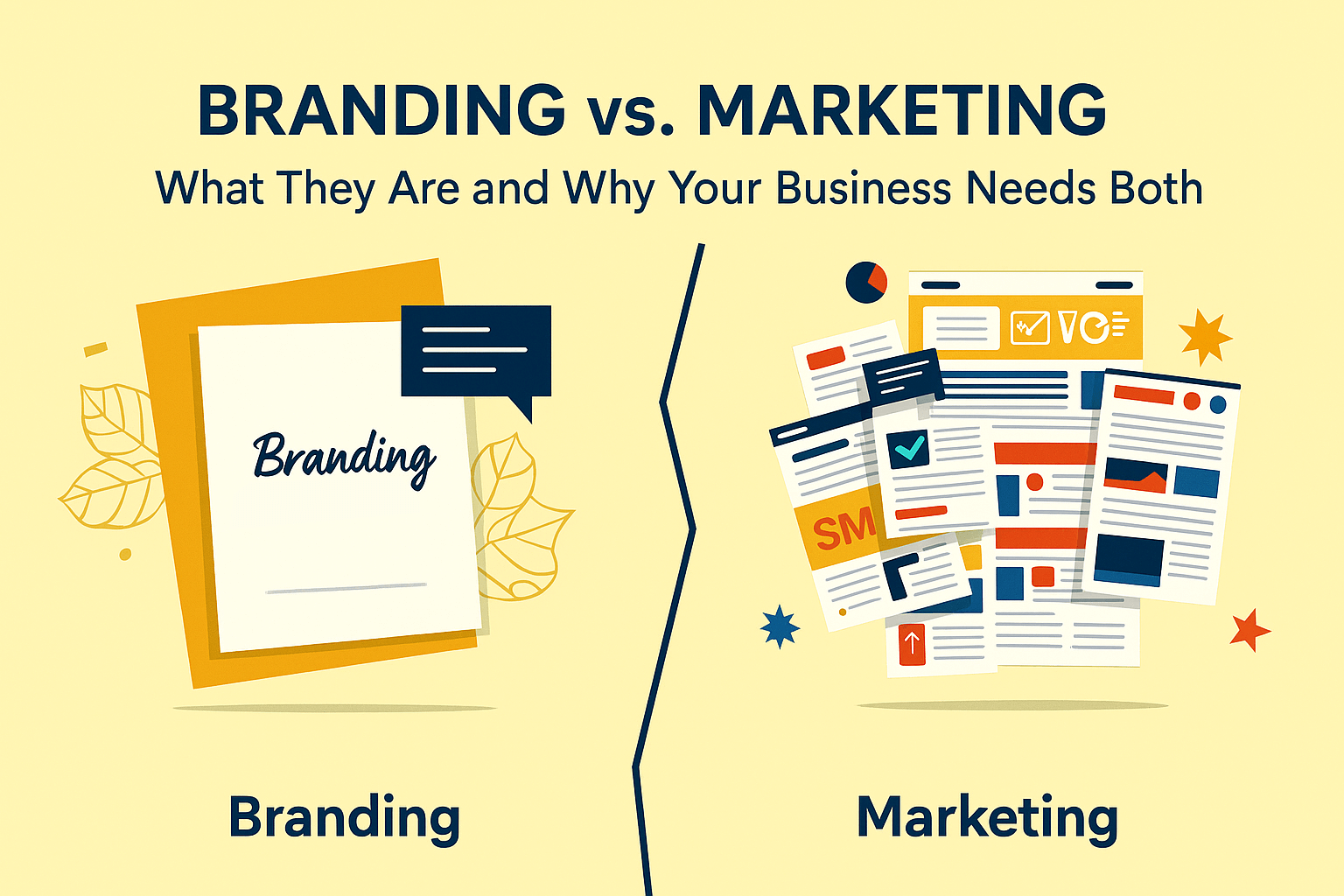What is Branding? How is it Different from Marketing? How Does It Benefit a Business?

In today’s highly competitive business world, branding has become a crucial strategy that no business can afford to overlook. However, many people still confuse what branding actually is, how it differs from marketing, and what benefits it brings to a business. This article will give you a detailed understanding of branding, its benefits, and the strategies for building a strong brand.
What is Branding?
Branding is the process of creating and developing the identity of a business, product, or service to establish a lasting impression and positive feelings in the minds of consumers. It’s not just about designing a logo or slogan—it’s about crafting the overall experience that customers have when they interact with your brand. We offer brand monitoring services from our end.
Branding encompasses every element that relates to your business image: name, logo, colors, fonts, design, sound, scent, taste, values, vision, and mission. A successful brand clearly communicates the identity of the business, distinguishes it from competitors, and builds long-term customer loyalty.
How is Branding Different from Marketing?
While branding and marketing must work together to maximize business impact, they differ in several key ways:
• Objective: Branding focuses on long-term image and identity, while marketing aims to drive short- to mid-term sales.
• Scope: Branding involves every aspect of the business that touches the customer; marketing centers on promotional and communication activities.
• Timeline: Branding is ongoing and long-term; marketing campaigns have defined durations.
• Measurability: Branding results are harder to quantify and take longer to manifest; marketing results (like sales) are clearer and quicker to measure.
• Customer Relationship: Branding builds long-term emotional connections and loyalty; marketing often focuses on short-term purchase decisions.
Why is Branding Important?
Branding plays a crucial role in a business’s long-term success through:
• Differentiation: Makes your business stand out in a crowded market.
• Credibility: A strong brand builds trust and confidence in your offerings.
• Loyalty: Good branding creates emotional bonds, leading to customer loyalty.
• Added Value: Customers are willing to pay more for a brand they trust.
• Consistency: Aligns all parts of your business, ensuring a consistent customer experience.
What are the Benefits of Branding for a Business?
Aside from shaping your public image, branding offers many other benefits:
1. Increases Credibility
Effective branding creates a trustworthy image. When customers see consistency, quality, and values that align with theirs, they develop confidence in your business. This enhances competitiveness and can even help position your brand as an industry leader.
2. Lays the Foundation for Long-Term Success
Branding is a long-term investment that pays off over time. A strong brand can help businesses weather tough times and expand into new markets or launch new products more easily, thanks to an already loyal customer base.
3. Defines a Unique Brand Identity
Branding gives your business a distinct identity that reflects your values, vision, and mission. This clarity makes it easier for customers to understand and relate to your brand, and ensures consistency across all marketing communications.
4. Simplifies Marketing
With a strong brand, marketing becomes more straightforward and effective. You already know your identity, target audience, and core messaging, which makes it easier to design campaigns that resonate. Trusted brands also find it easier to launch new products or services.
5. Increases Business Value
A strong brand adds significant value to your company, both financially and intangibly. Popular brands can charge premium prices because customers are willing to pay for expected quality and experience. Strong branding also enhances your company’s reputation, attracting investors, business partners, and top talent.
Key Branding Strategies
To build a strong brand, you need a well-rounded and effective strategy. Here are the essentials:
1. Storytelling
Telling your brand’s story helps build emotional connections. A compelling story helps customers understand your origin, values, and mission. For example, TOMS Shoes’ story of donating a pair of shoes for every pair purchased connects with customers’ sense of purpose.
2. Creating a Unique Brand Voice
Your brand voice is the unique communication style used across all platforms—website, social media, ads, etc. A clear and consistent voice helps your brand stand out. For example, Old Spice uses a humorous and exaggerated tone to differentiate itself in the men’s grooming market.
3. Building a Distinct Brand Identity
Brand identity includes visual elements like logos, colors, fonts, and design. A consistent and eye-catching identity makes it easier for customers to recognize and connect with your brand. Apple is a great example with its clean, modern, and minimalist design language.
4. Sticking to Brand Values
Brand values are your guiding principles. Consistently living these values boosts credibility and appeals to like-minded customers. Patagonia, for example, promotes environmental conservation through every aspect of its brand.
5. Defining the Brand Vibe
Brand vibe is the overall atmosphere your brand creates across all touchpoints—website, stores, customer service. A well-defined vibe enhances customer experience. Starbucks creates a cozy, welcoming vibe that encourages customers to stay and enjoy their time.
6 Key Metrics to Measure Branding Success
To evaluate branding effectiveness and improve your strategy, track the following metrics:
1. Online Presence
• Google Search Rankings: Indicates how often and how well your brand appears in relevant searches.
• Website Traffic: Reflects interest in your brand (also look at bounce rate and time on site).
• Social Media Followers: Shows the size of your engaged audience.
2. Engagement
• Blog Comments and Shares: Show interest and interaction with your content.
• Social Media Likes, Comments, Shares: Measure how actively your audience engages with your posts.
• Participation in Campaigns/Events: Reflects connection and commitment to your brand.
3. Conversion
• Lead Generation: Tracks people showing interest, e.g., signing up for newsletters or requesting quotes.
• Conversion Rate: Measures how many visitors turn into paying customers.
• Customer Lifetime Value (CLV): Reflects the long-term financial impact of customer relationships.
4. Reach and Impressions
• Reach: Number of unique people exposed to your content.
• Impressions: Total times your content is displayed.
• Share of Voice: Your brand's visibility compared to competitors.
5. Top of Mind Awareness
• Brand Recall: Whether customers can remember your brand without help.
• Brand Recognition: How well they recognize your brand when prompted.
• Share of Search: Your brand’s share of search engine queries compared to competitors.
6. Brand Loyalty
• Repeat Purchase Rate: Percentage of customers who buy again.
• Net Promoter Score (NPS): Measures how likely customers are to recommend your brand.
• Customer Retention Rate: Indicates how well you keep your customers over time.
Conclusion
Branding is the process of creating a powerful identity and image for your business, product, or service. It differs from marketing in its goals, scope, and timeline. Effective branding leads to increased trust, customer loyalty, and higher business value.
To build a strong brand, businesses need diverse strategies and consistent performance measurement using key branding metrics. If you're unsure where to start, Securium Solutions is ready to support you. With a network of companies offering marketing services, we can provide expert guidance tailored to your branding needs.
Note: IndiBlogHub features both user-submitted and editorial content. We do not verify third-party contributions. Read our Disclaimer and Privacy Policyfor details.







